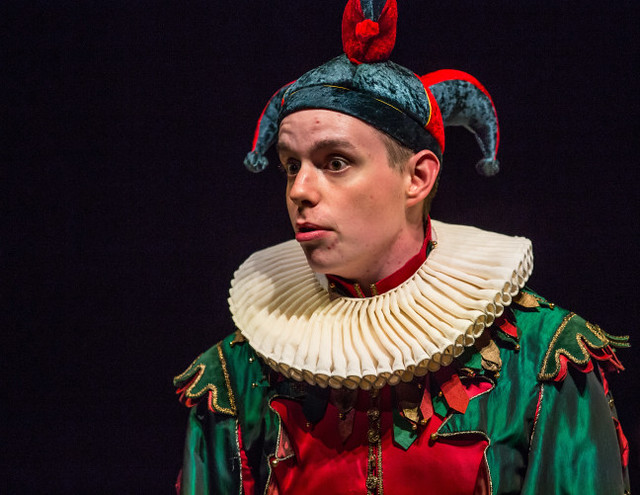Performances & Events
Nashe's writing is attentive to voice and the performance possibilities of prose. However, because we think of him as a prose writer rather than a dramatist, we often approach his words silently on the page. As part of The Thomas Nashe Project, we have been exploring the performance possibilities of all of Nashe's texts, which you can read about below.
There's still time to join us at future Nashe events! We will be having a conference in Newcastle on the 12-14th July 2018 (read all about it here) and in October 2018 we will be holding public events at the Time and Tide Museum and Elizabethan House Museum in Great Yarmouth, including readings from Lenten Stuffe and a lecture by Nashe's biographer, Charles Nicholl.
Our first symposium
On the 20th May 2017 The Nashe Project held its first public event, the symposium Thomas Nashe: Prose, Drama, and the Oral Culture of Early Modern London.
For a summary of events from Twitter, click here.
We received lots of feedback from this symposium, and to hear a selection you can listen to this recording to hear a range of people, including Nashe's biographer Charles Nicholl, talking about their interest in Nashe:
Recording by Nick Baker of Testbed Audio
"Terrors of the Night" performance
On the 20th May 2017, the Nashe Project hosted a 'Read Not Dead' reading of Nashe's The Terrors of the Night by candlelight at the Sam Wanamaker Playhouse. Because 'Read Not Dead' usually works with underperformed plays, the editor of this prose text, Kate De Rycker, collaborated with the director Jason Morell to produce a new script, ready for performance, which you can read by clicking here.
Edward's Boys perform "Summer's Last Will"
September 2017 saw four remarkable performances of Summer’s Last Will and Testament by Edward’s Boys, directed by Perry Mills, in association with the Thomas Nashe Project. These performances – in King Edward VI School, Stratford-upon-Avon, the Sam Wanamaker Playhouse at Shakespeare’s Globe, and the Great Hall of the Old Palace School in Croydon – marked the first performance of Summer’s Last Will, Nashe’s only sole-authored drama, for over 400 years.
We’re very pleased to present a full recording of the performance in Croydon – in the very space where Summer’s Last Will was first performed in the autumn of 1592!
Please also see below for further resources, including links to reviews of the production.
Click here to hear an audio commentary by the Summer's Last Will cast.
Or you can read their director, Perry Mills', reflections on rehearsing this play at the "Before Shakespeare" conference last August.
Please see the Editions page of this website to read an introduction to the play from its editor, Bart Van Es.
You can also view a gallery of images from the production below.
Reviews:
Matthew Lyons, "Summer in autumn", TLS online, Oct. 16th 2017
Roderick Dunnett, "Summer's Last Will and Testament", Stratford, Behind the Arras
Further reviews by Sonia Massai in Shakespeare Quarterly and Harry McCarthy in The Shakespeare Bulletin forthcoming...
In Praise of the Red Herring: Thomas Nashe in Great Yarmouth
A talk by Charles Nicholl, Friday 5 October (11.30am)
Thomas Nashe arrived in Great Yarmouth in late 1597, a fugitive from London after his stage comedy was judged to be 'seditious and slanderous'. The product of his stay in the town was his last and most unique work, Lenten Stuffe, inspired by his gratitude towards Yarmouth.
In this talk, Nashe's biographer Charles Nicholl celebrates the extraordinary lingustic range of Lenten Stuffe, from the journalistic skills used in Nashe's description of the town to the exuberant rhapsody on the theme of the red herring which has drawn comparisons with Laurence Sterne and James Joyce.
A collaboration between the Thomas Nashe Project and the Time and Tide Museum of Great Yarmouth Life
Date and time: Friday 5 October, 11.30am
Location: Time and Tide Museum, Blackfriars Road, Great Yarmouth, NR30 3BX
Tickets are free - but booking is essential! Telephone 01493 743930, or email yarmouth.museums@norfolk.gov.uk.
Thomas Nashe and his contemporaries. Newcastle University, 12-14th July 2018

Nashe's network created using Six Degrees of Francis Bacon mapping function
“I sometimes feel that if I fully understood Nashe, I would understand the entire early modern period.” — Alan Stewart.
Thirty years ago Thomas Nashe would have been described as an outlier of Elizabethan literature or redeemed as a postmodernist avant la lettre. More recently, critics have begun to understand Nashe as deeply enmeshed within early modern culture, an author who worked between patronage and the print shop, and who broadened the range of English literature by experimenting with different genres and media. This conference will explore the variety of Nashe's networks and collaborations in order to understand more about the early modern period.
 Thanks to generous funding from the Society for Renaissance Studies, we are able to provide bursaries for PhD students and fixed-term ECRs presenting at this conference. For more information, please email: nashe.contemporaries@gmail.com.
Thanks to generous funding from the Society for Renaissance Studies, we are able to provide bursaries for PhD students and fixed-term ECRs presenting at this conference. For more information, please email: nashe.contemporaries@gmail.com.
Below you will be able to read our programme, book a place on our conference, find accommodation, and find your way around Newcastle!





